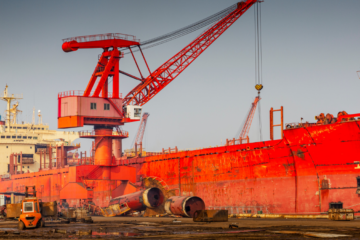The international marine insurance market is a specialised and vital component within the insurance industry and a critical component in global trade. Protecting various stakeholders involved in maritime operations for the unique risks and challenges associated with maritime activities. Time to dive a little deeper into the world of international marine insurance.
International marine insurance: a 35 billion dollar industry
A large number of insurers operate worldwide to provide cover for Marine Cargo, Hull & Machinery, Energy & Offshore and P&I. In total, the annual premium volume of international marine insurance is approximately 35 billion dollars (USD).
To openly compare this figure, the total annual premium volume of all non-life insurances worldwide is about 900 billion dollars (USD). This means that the international marine insurance has only a small market share of less than 4%.
Four main categories in international marine insurance
This market is divided into four main categories with the following market shares: Marine cargo (50%), Hull & Machinery (20%) including time loss and war, Energy & Offshore (20%) and Protection & Indemnity (10%). We will explain these categories below.
- Marine cargo insurance protects goods and cargo during the transit. It covers various risks, including damage, theft, loss, and damage caused by accidents. Cargo owners and shippers rely on this coverage to mitigate financial losses due to unforeseen events during transportation. Policies can be tailored to specific cargo types and shipping routes.
- Hull & Machinery (H&M) insurance safeguards the physical structure and machinery of vessels, including ships and boats. It covers damages caused by accidents, collisions, and other perils. Shipowners and operators rely on H&M insurance to ensure the seaworthiness of their vessels and protect their substantial investments. Policies consider vessel condition, age, and usage patterns.
- Energy & Offshore insurance provides coverage for risks associated with offshore operations, including oil and gas exploration, drilling, and production. It includes coverage for equipment, personnel, and environmental liabilities. It plays a crucial role in supporting the energy industry’s offshore activities, ensuring that potential losses and liabilities are manageable. Policies are highly specialized and address the unique risks of offshore operations.
- Protection & Indemnity (P&I) insurance covers shipowners and operators for liability risks related to their vessels. This includes liabilities for collisions, pollution, personal injury claims, and more. It is important for shipowners to protect themselves from potentially massive liabilities that can arise from accidents or incidents at sea.
International marine insurance indispensable for global trade
It plays an important role in the world economy, because the transport needs are huge. We talk about an annual volume of 11 billion tonnes of cargo. Carried by approximately 100,000 ships. With 2 billion tonnes of shipping spaces available.
All these ships and cargoes are often financed with imposed clauses from banks that valid marine insurance is present. This is why shipowners, operators, cargo owners, shippers, charterers and all stakeholders within this global supply chain need to be aware of their coverage and insurances. We cannot do without their ships. In comparison, a 747 cannot ship 50,000 tonnes of grain, coal or fertiliser by air.
Maintaining quality international marine insurance is teamwork
Bringing it closer to home, IMU is a boutique MGA. Specialised in Charterers’ Liability insurance. Over 250 charterers use our cover and insurance. However, our market share is almost negligible compared to the 35 billion dollar industry of international marine insurance.
Nevertheless, we take our presence in maintaining quality international marine insurance very important. The chain is as strong as its weakest link. So let us, above all, take our responsibility together to keep the marine transport on the right track.
The best growth is towards each other. This means both the insurer and the customer need to work on that. At IMU, we are convinced that customers will take their responsibilities if it is clear that we also take our responsibilities.
Read more about this shared responsibility and how this is the only way for cost-effective pricing to work. Click here to continue reading.



